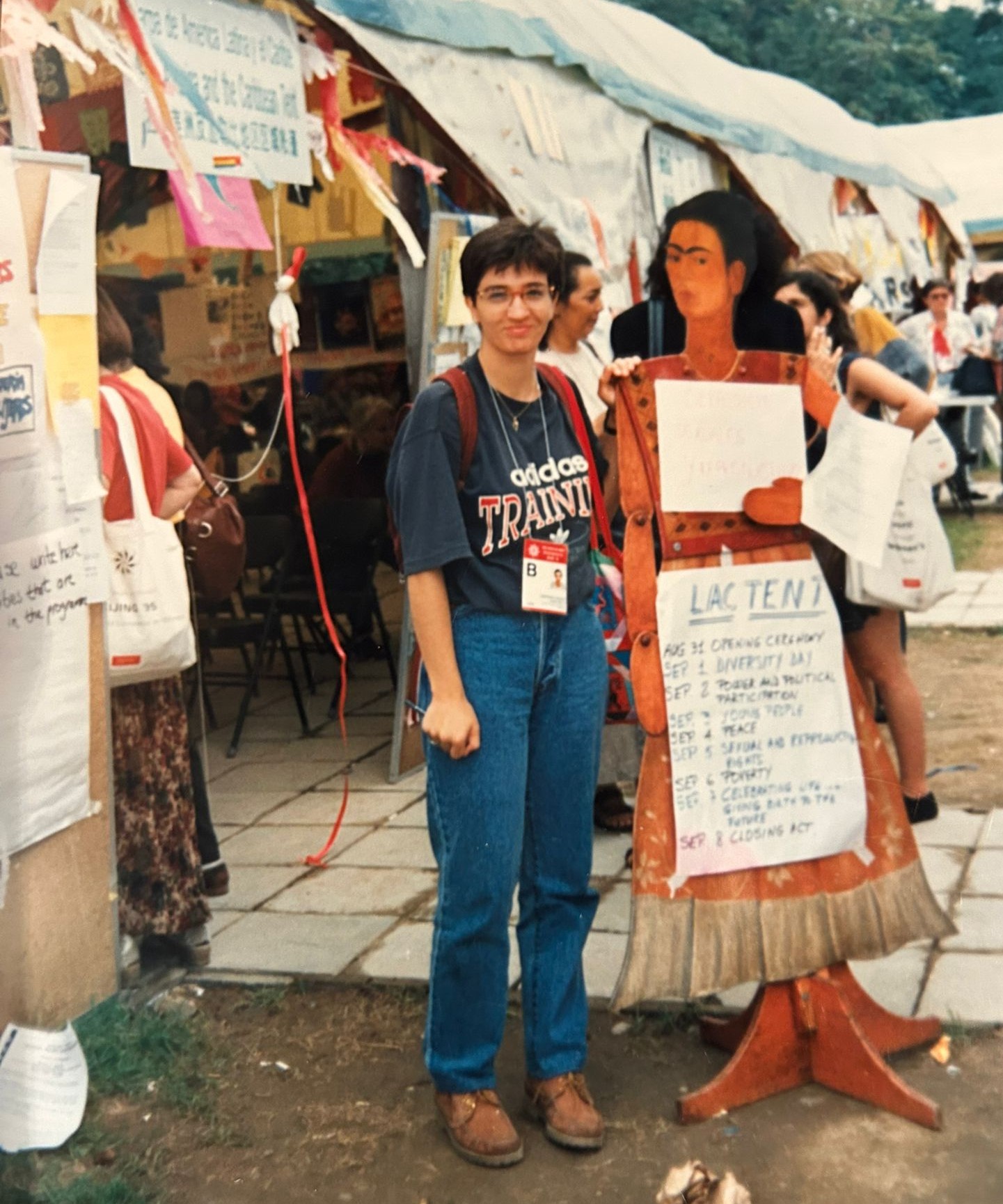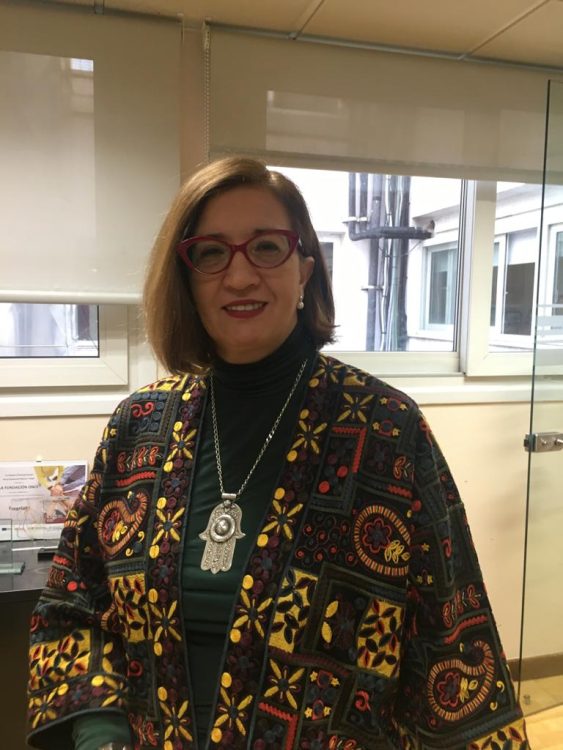HelpAge International is launching a campaign to honour the 30th anniversary of the historic 1995 Beijing Conference by spotlighting remarkable women who attended and helped shape the global gender equality agenda.
Older women, caregiving, and the silent crisis of gender inequality
In this interview, Isabel María Martínez Lozano reflects on the power of global solidarity, the progress made in gender equality, and the alarming pushback against women’s rights today. She discusses the persistent challenges facing older women, the need for intergenerational activism, and why feminist movements must stay united in the fight ahead.
What are your strongest memories of the Beijing Conference in 1995?
My memories of the conference are extraordinary for several reasons. Firstly, I was twenty-six years old, had just finished my studies, and had secured a good job. As a feminist activist, I possessed the enthusiasm of youth, truly believing in my capacity for change.
What struck me most about Beijing was witnessing the immense diversity of women from all over the world yet sharing the same realities despite our differences. The narratives and challenges were identical. I was profoundly impacted by the speeches of both American women, such as Jane Fonda and Hillary Clinton, and African women like Gertrude Mongella, who played an extraordinary role.
The atmosphere was one of solidarity, with a profound conviction that our advocacy was improving the lives of everyone, not just women. Many messages resonated deeply, particularly the call to “see the world through the eyes of women.” The richness of such a vast and vibrant gathering of women could only have led to the powerful declaration that was ultimately agreed upon, made possible by the solidarity of so many leaders.

How have women’s lives globally changed since 1995?
Undoubtedly, the past thirty years have witnessed significant progress towards gender equality in all parts of the world. Indicators of employment, shared domestic responsibilities, and women’s participation in leadership positions have improved positively across all regions. Social attitudes have also evolved, as evidenced by the growing number of young women committed to upholding values of equality within their families.
However, data also indicate stagnation and even regression, particularly with the rise of far-right ideologies across the world, spearheaded by figures such as President Trump, who challenge feminist social progress, deny gender-based violence, and seek to reinstate a patriarchal social model that subordinates women.
A particularly alarming trend is the persistence – and even increase – of sexual violence, including among younger men. In a truly egalitarian society, such violence should decrease; yet not only has it not declined, but cases of sexual assault among younger demographics are on the rise. Something is failing in our social and family values, as well as in society’s tolerance of these severe sexist behaviours.
Furthermore, progress in shared caregiving responsibilities and the presence of women in leadership roles remains slow.
Do you believe that the rights of older women are being promoted and protected? Do you feel their voices and experiences are included in the struggle for gender equality?
Older women face intersectional discrimination with multiple consequences. They receive lower pensions and incomes, continue to bear caregiving responsibilities even when they themselves require care, and experience severe employment discrimination from the age of fifty onwards, particularly in industries where appearance is scrutinised. They are also subjected to the harshest forms of age-related stereotypes.
In short, women live longer but suffer from poorer health, have more chronic illnesses, and face greater financial hardship. Gender-based violence remains a significant issue for many older women, who often lack the means to escape long-standing cycles of abuse. However, an encouraging aspect is their resilience and their ability to forge support networks within their communities.
Has the Beijing Declaration and Platform for Action met your expectations? Do you see gaps in its implementation?
I believe the Platform for Action has led to the development of strategies and public policies in many countries. It outlined actions across all societal sectors and involved all public and private stakeholders. However, a review is necessary to address emerging issues, particularly caregiving, which requires stronger public policies, as well as ensuring gender equality in technological development, artificial intelligence, and addressing gender bias within the new technological revolution and climate change.
Thirty years later, has your perspective on gender equality and empowerment changed? Do you feel hopeful?
Feminism has not changed – rather, the issues and forms of gender discrimination have evolved, requiring new approaches to achieve an egalitarian society where men and women enjoy the same rights and opportunities. I am an optimist by nature, but the current political climate is reactionary and concerning for women.
After the rise of the fourth wave of feminism in 2017, which demonstrated the movement’s strength and transformative capacity worldwide, we are now witnessing political and social regression. The far-right populist movements are instilling fear, dismantling social and equality policies. The consequences will be dire if we fail to act in time – women will once again suffer the brunt of inequality, including increased violence, diminished employment opportunities, lower wages, poorer working conditions, and exclusive domestic burdens.
If you could share one reflection or thought, what would it be?
Women’s progress has always been achieved through the actions of feminism at an international level. The feminist movement has always been global, advancing when women unite to build and advocate for a common agenda while recognising the diversity of women’s experiences. It is therefore crucial to foster understanding and move beyond divisive debates within feminism.
I do not intellectually or ideologically support conflicts among feminists regarding new gender identities. The concept of “woman” is not under threat from transgender women. Since the nineteenth century, feminism has encompassed diverse perspectives and priorities but has always maintained a shared agenda. Given today’s adverse socio-political climate, it is more important than ever to rally around this common agenda, with the fight against gender-based violence at its core.
How do you perceive the collaboration between young and older activists in the fight for women’s rights today?
I strongly believe in intergenerational feminist activism. In a society where up to four generations coexist, we must support and learn from one another. Ageism is an issue that unites both young and older women, as both groups face discrimination due to their age. The ideal is a society that accommodates all ages. One of the greatest achievements of the fourth wave of feminism has been its intergenerational nature, where feminist solidarity ensures that the challenges faced by both younger and older women are addressed with equal urgency.
 Isabel María Martínez Lozano is currently the Chair of HelpAge Spain. She holds a PhD in Social Sciences from the Universidad de Valencia and a degree in Information Sciences from the Universidad Complutense de Madrid.
Isabel María Martínez Lozano is currently the Chair of HelpAge Spain. She holds a PhD in Social Sciences from the Universidad de Valencia and a degree in Information Sciences from the Universidad Complutense de Madrid.
She has held several positions with the Spanish government – Secretary-General for Social Policy and Consumer Affairs as well as Secretary-General for Equality. She is currently the Commissioner of Fundación ONCE for Universities, Youth, and Special Programmes.
